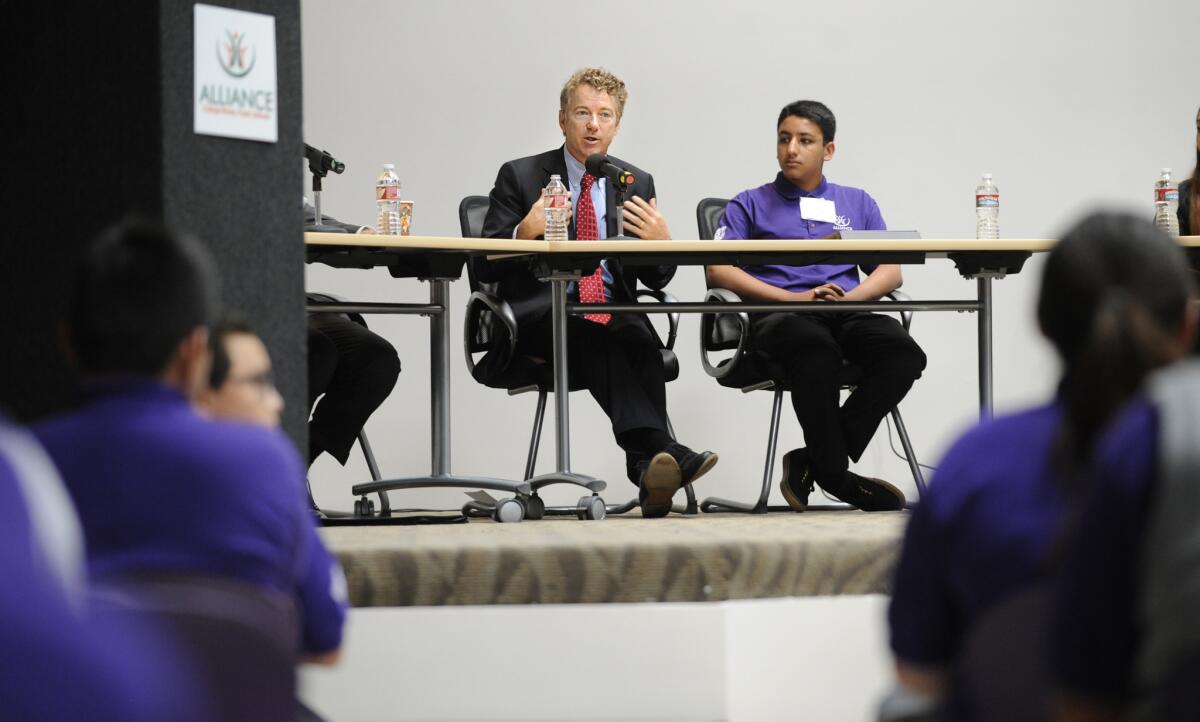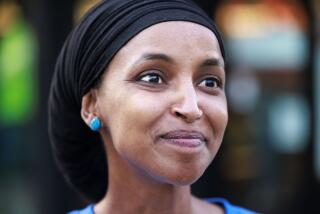Rand Paul says U.S. intervention made Islamic State stronger

Sen. Rand Paul said Friday that the United States’ intervention in the Middle East has made the Islamic State militant group stronger, and that he voted this week against arming Syrian rebels because he fears the weapons would end up in the hands of the terrorists.
“I think for the last year or two, when we’ve been giving weapons to the Syrian rebels, we’ve actually allowed ISIS to grow stronger,” Paul, using an acronym for the group, said in an interview after speaking on a school-choice panel in San Pedro.
The Kentucky Republican, who said that he will decide by spring whether to run for president in 2016, has come under repeated criticism for his foreign policy views from more hawkish members of his own party. While he opposes much U.S. involvement overseas, Paul has tried to distance himself from the isolationist views espoused by his father, the former Rep. Ron Paul, who also ran for president.
But in voting against arming the Syrian rebels, Paul was in the minority. The legislation was approved on a bipartisan vote by both the Senate and the House this week, and was signed into law by President Obama on Friday.
In the interview, Paul attributed the rise of radical Islamists to the fall of secular dictators in the Middle East. He said he was weary of inserting the United States in that region’s civil wars, but added that the nation must act against the Islamic State because of the threat that group poses to the West. He has not specified how he would do that.
“I don’t want our troops back in Iraq. I’m willing to provide air support, intelligence, coordination and money and armaments and that’s quite a bit, but the Iraqis need to step up and fight,” he said. “Our intervention has made ISIS stronger but now it’s such a problem that I do think we have to do something about it.”
He spoke to The Times after participating in a panel about school choice at the Alliance Alice M. Baxter College-Ready High School in San Pedro. Paul favors local control and decision-making and is critical of educational testing and standards that come from the federal government.
Speaking with students, a parent, a teacher and a principal, Paul said improving education through innovative practices such as those seen in charter schools was a bipartisan issue.
“There are a lot of good schools in our country, but then there are some not so good schools,” he said. “Education is the great equalizer.”
Paul is in California on a two-day swing that includes a keynote speech on Saturday to a sold-out luncheon at the California Republican Party convention. The state party is at a historic low in terms of the percentage of registered voters, but Paul said he plans to tell Republican activists that they can improve the GOP’s performance in California by expanding the party, notably among working-class and Latino voters.
“We can win in California, Republicans can win California, presidentially, governor, you name it, we can win,” Paul said. “But we have to have a bigger, more inclusive party and I’ll talk about different issues that I think will attract new people to the party. And one of them is school choice, frankly…. Showing that you care about kids and showing that you care about education is something I think Republicans need to do a better job of.”
Republicans here have argued for years that their support for school choice would swing voters their way, but the issue has not proved to have the transformative power Paul suggested. Many Republican office-holders also hold views on issues such as abortion rights and immigration that clash with California voters overall, limiting their ability to succeed.
Follow our convention coverage this weekend at latimes.com, and follow @LATSeema for political news.
More to Read
Sign up for Essential California
The most important California stories and recommendations in your inbox every morning.
You may occasionally receive promotional content from the Los Angeles Times.










